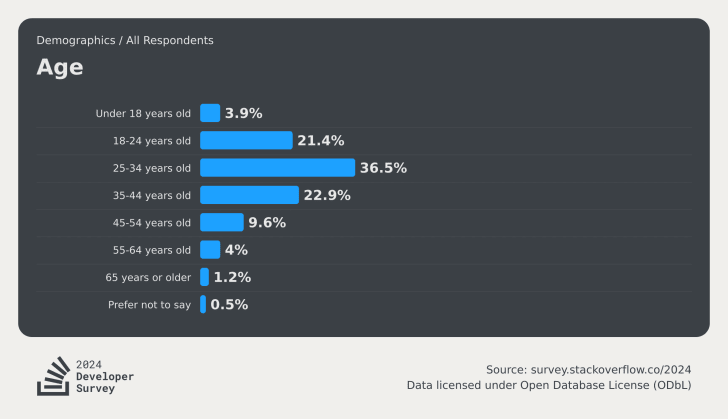I’m 30 years old as of writing this, and I’ve been on both sides of the interview table. For the past year, I’ve been conducting technical interviews for the company I work for. I’ve seen fresh-faced graduates barely old enough to rent a car, and I’ve talked to developers with more years of experience than I’ve been alive. It’s been eye-opening, to say the least.
It’s a weird spot to be in, straddling the line between “young” developer and hiring gatekeeper. On one hand, I’m not that far removed from being the fresh-faced newbie in the room. On the other, I’m now in a position to influence who gets a shot at joining our team. At 30, I’m right in that sweet spot where I can relate to both the eagerness of youth and the value of experience.
It’s tough to get solid data on age-based hiring practices in tech. Companies aren’t exactly forthcoming about this information, and for good reason - age discrimination in hiring is illegal in many places. But that doesn’t mean we’re completely in the dark. We can look at some broader trends in tech employment and hiring patterns.
Does Age Matter?
The 2024 Stack Overflow Developer Survey, which included responses from over 64,000 developers worldwide, offers the most current snapshot of age demographics in tech:
- Most developers in the survey report being 25-34 years old (36.5%)
- The average age of developers was 32.2 years.
- Only 15.3% of respondents were over 45 years old.

The reality is that age can be a factor in tech hiring, sometimes overtly, often subtly. However, I believe the industry is slowly but surely recognizing the value of age diversity.
While the tech industry has often been criticized for its youth-centric culture, some major companies are taking steps to address age diversity. Here are some notable examples:
Google:
- After settling an age discrimination lawsuit in 2019, Google has amplified its efforts to promote age diversity.
IBM:
- IBM’s “New Collar” initiative focuses on skills over traditional credentials, opening doors for career changers of all ages.
- They’ve partnered with organizations like AARP to create “returnship” programs, helping older workers transition into tech roles.
- IBM has publicly committed to a “skills first” approach, emphasizing capabilities over age or background.
Microsoft:
- Microsoft has expanded its employee resource groups to include “Experienced Microsofties” for employees over 40.
- They’ve increased mentorship programs pairing older and younger employees for mutual learning.
- Microsoft’s AI for Accessibility program indirectly supports older tech workers by funding projects that can benefit older users, often led by experienced developers.
Amazon:
- Amazon’s Returnships program is designed to help professionals restart their careers after a break, which often benefits older workers.
- They’ve increased their focus on “life-long learning” initiatives, providing resources for employees of all ages to update their skills.
Apple:
- Apple has been quietly increasing its age diversity, with Tim Cook noting in a 2019 interview that their oldest employee was 81.
- They’ve expanded their health benefits and retirement planning services, making the company more attractive to older workers.
These initiatives are steps in the right direction, but it’s important to note that their effectiveness varies. Many argue that more systemic changes are needed to truly address ageism in tech. However, these programs do indicate a growing awareness of the value of age diversity and the need to combat age-related biases in the industry.
A Word of Caution
While these initiatives sound promising on paper, it’s wise to approach them with a healthy dose of skepticism. As someone who’s been in the industry for a while, I’ve seen my fair share of corporate PR stunts that look good in press releases but don’t always translate to meaningful change on the ground.
It’s essential to look beyond the headlines and dig into the details of these programs. Are they truly inclusive, or do they inadvertently reinforce age stereotypes? Are they addressing the root causes of ageism in tech, or are they just window dressing?
In my opinion, tech needs all kinds of minds to solve the complex problems of our world. Your unique perspective, shaped by your experiences, is valuable. Whether you’re a coding prodigy or a career changer, there’s a place for you in this industry.
My Personal Take
I’ve come to a conclusion: Age doesn’t matter, as long as the person has the skills required to succeed in the job.
It’s that simple. Whether you’re 22 or 62, if you can code, problem-solve, and contribute to the team, you’re valuable. Period.
That said, I do think there’s wisdom in addressing the elephant in the room during the hiring process. For older candidates, it’s wise to discuss future retirement plans and talk with them about their career goals. This isn’t about discrimination – it’s about ensuring that both the company and the candidate are on the same page about long-term expectations.
These conversations can actually be beneficial for candidates of all ages. A 25-year-old might be planning to start a family soon, while a 45-year-old might be looking to transition into a leadership role. Understanding these aspirations helps create a better fit for everyone involved.
It’s never too late to start, and it’s never too late to keep pushing the boundaries of what’s possible in tech. The industry is evolving, and so should our attitudes about age.